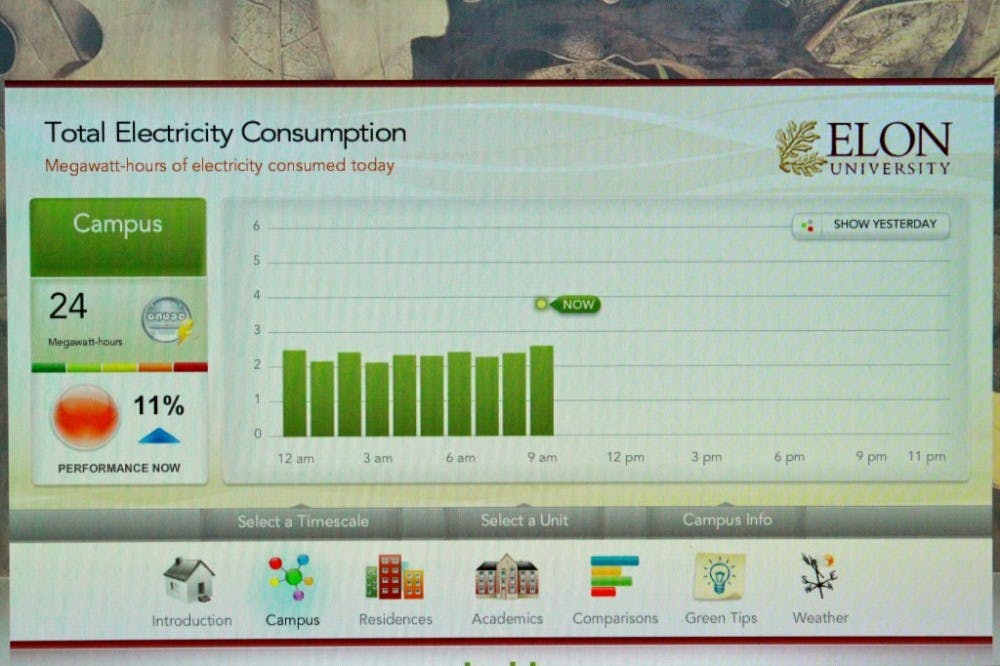Elon University has implemented a variety of sustainable initiatives with markedly positive results, and others have taken notice. Through the rankings of an independent survey company, Elon was ranked 29th on the list of "96 Cool Schools," published in the September/October edition of Sierra Magazine, the official publication for the Sierra Club.
The survey measures sustainability efforts such as energy, transport, waste, water, planning, purchasing, food, investing/innovation and education/research. The ranking, which was open to all four-year undergraduate universities and colleges in the United States, was completed through an online system.
But it does not take a ranking system for the sustainable measures to gain recognition from students. Junior Peter Kesaris said he was generally pleased with Elon University’s sustainability programs.
“I think Elon is green, at least compared to other schools in the U.S., but I still think we could make more strides, like having a wider variety of recycling bins, especially in the dorms,” he said.
Junior Sean Patterson expressed to a similar viewpoint.
“I think that there’s always more that can be done to improve the sustainability of our campus," Patterson said. "Still, there are things that Elon does to promote 'going green' such as using biodiesel fuel for our buses and composting waste from food in the dining halls (at an off-campus facility)."
Elon University’s master plan for sustainability, developed in 2006 by the Environmental Advisory Council, includes such efforts as the Biobus, a biofuel transportation system, and LEED certified, highly efficient buildings.
Elaine Durr, director of sustainability, has been a part of such changes, additions and improvements at Elon, including two educational components.
Creating a More Sustainable Workplace, a program for faculty and staff, was started to inform participants about Elon’s efforts to become a more sustainable university and improve personal sustainability in the workplace. Durr indicated the student version, the Sustainable Living Guide, is easily accessible and comprehensive.
Students can access the Sustainable Living Guide from the Sustainability website. The guide provides tips to reduce environmental impact in terms of power, water consumption, waste management, transportation and purchasing.
Sophomore Grace Rubright said she sees vivid examples of programs that prompt students to follow through.
“I do think Elon is keeping up with the whole green movement," Rubright said. "I am seeing that with all the events that residence halls hold to see which dorm can use the least amount of energy. Even just this year, I am noticing that I am given no paper handouts anymore and that everything is online.”
Furthermore, a small electronic item recycling program, which was started in the spring, provides students a quick outlet for instant sustainability. Items such as cell phones, computer speakers, CDs, DVDs, cords, cables and chargers, can be recycled in the following locations: Belk Library in the main stairwell, McEwen Communications Room 105 in McEwen Communications and in the Office of Sustainability, located in Mooney.
Sustainability is visible in campus dining facilities as well. During fall 2011, Elon Dining Services joined the NC 10% Campaign: a pledge to spend 10 percent of their food dollars within the state. Additionally, Colonnades Dining Hall now utilizes geothermal energy, a concept Durr said works pretty naturally.
“The system serves as the primary heating and cooling source for these buildings reducing the need for fossil fuels," she said. "The system consists of heat pumps that utilize the Earth’s nearly constant temperature to heat and cool the buildings. They transfer heat from the ground into the buildings in the winter and reverse the process in the summer.”
The Colonnades residential neighborhood is also equipped with geothermal systems and is one of a few areas of campus included in the solar thermal project, which was completed summer 2011. Durr said this effort in sustainable alternatives is expected to prevent 49 tons of carbon emissions each year.
The project consists of 82 solar thermal panels on five buildings: Colonnades Dining Hall, Story Hall, Emmett L. Moffitt Hall and Danieley Center I & K.


